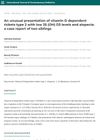 January 2018 in “Przegla̧d dermatologiczny”
January 2018 in “Przegla̧d dermatologiczny” Hair loss may increase heart disease risk.
 373 citations,
September 2009 in “Obstetrics & Gynecology”
373 citations,
September 2009 in “Obstetrics & Gynecology” The bulletin provides guidelines for diagnosing and managing PCOS, suggesting weight loss, hormonal contraceptives, and diabetes screening, with clomiphene for infertility and various treatments for excess hair.
 198 citations,
July 2011 in “Cochrane library”
198 citations,
July 2011 in “Cochrane library” Lifestyle changes can improve body composition, excess male hormone levels, and insulin resistance in women with PCOS.
 36 citations,
January 2015 in “Dermatology”
36 citations,
January 2015 in “Dermatology” Bimatoprost was found to be safer and more effective than mometasone furoate for treating scalp hair loss.
31 citations,
September 2003 in “International Journal of Dermatology” Vitamin D-dependent rickets Type II causes bone problems and hair loss, and doesn't improve with Vitamin D treatment.
 19 citations,
October 2004 in “Best Practice & Research in Clinical Obstetrics & Gynaecology”
19 citations,
October 2004 in “Best Practice & Research in Clinical Obstetrics & Gynaecology” The diagnosis of polycystic ovary syndrome (PCOS) requires a detailed patient history, ultrasound scanning, hormone level checks, and assessments of ovulation, obesity, and insulin resistance. It's a variable condition that needs individualized management and is a significant risk factor for type 2 diabetes.
3 citations,
May 2002 in “PubMed” The document concludes that treatment for excessive hair growth depends on the cause, with options including hair removal methods and medications like anti-androgens or insulin-sensitizing drugs.
 July 2022 in “International Journal of Contemporary Pediatrics”
July 2022 in “International Journal of Contemporary Pediatrics” Two siblings with a rare type of rickets and hair loss had low vitamin D levels, which is not typical for their condition.
April 2019 in “Journal of the Endocrine Society” A young patient with unusual insulin resistance and high testosterone levels had a rare INSR gene mutation.
 December 2016 in “Springer eBooks”
December 2016 in “Springer eBooks” Chrousos Syndrome is caused by mutations that make the body less sensitive to glucocorticoids, leading to various symptoms and requiring high-dose treatment.
January 2005 in “Elsevier eBooks” Insulin resistance and hyperinsulinism are linked to fertility issues and can worsen symptoms of PCOS.
September 2002 in “Fertility and sterility” Girls with PCOS often start puberty earlier and have signs of insulin resistance from a young age.
13 citations,
April 1994 in “Baillière's clinical endocrinology and metabolism” Some people have genetic mutations that make them resistant to vitamin D, leading to rickets even with enough vitamin D intake.
 4 citations,
April 2002 in “Medical Hypotheses”
4 citations,
April 2002 in “Medical Hypotheses” Hormones cause hair loss by affecting cell growth and weakening cell attraction.
 1 citations,
December 2022 in “Gynecological Endocrinology”
1 citations,
December 2022 in “Gynecological Endocrinology” The most common skin issues in females with Polycystic Ovary Syndrome (PCOS) are excessive hair growth, hair loss, oily skin, acne, dark skin patches, and skin tags, which may be linked to hormone and insulin levels.
 October 2024 in “Journal of the Endocrine Society”
October 2024 in “Journal of the Endocrine Society” A rare genetic mutation causes resistance to vitamin D, leading to severe rickets and requiring high doses of calcium and vitamin D for treatment.
December 2023 in “̒Ulūm-i dārūyī” New treatments for excessive hair growth in women, including advanced drugs and nanotechnology, show promise for better results.
 September 2023 in “JEADV Clinical Practice”
September 2023 in “JEADV Clinical Practice” People with common hair loss conditions may have a higher risk of heart disease and related health issues.
 January 2021 in “Medicine Science | International Medical Journal”
January 2021 in “Medicine Science | International Medical Journal” Men with early hair loss may have higher health risks similar to women with PCOS.
 May 2017 in “Endocrine Abstracts”
May 2017 in “Endocrine Abstracts” Men with early hair loss and certain health factors may have a higher risk of developing reproductive issues, similar to polycystic ovary syndrome in women.
 December 2006 in “8th European Congress of Endocrinology incorporating the British Endocrine Societies”
December 2006 in “8th European Congress of Endocrinology incorporating the British Endocrine Societies” Men with early hair loss and hormonal changes like PCOS could be the male equivalent of PCOS, not linked to metabolic syndrome.
 192 citations,
September 2003 in “The Journal of clinical endocrinology and metabolism/Journal of clinical endocrinology & metabolism”
192 citations,
September 2003 in “The Journal of clinical endocrinology and metabolism/Journal of clinical endocrinology & metabolism” Metformin is effective for treating excessive hair growth in women with PCOS and may work better than the standard treatment in some ways.
 February 2024 in “Brazilian Journal of Implantology and Health Sciences”
February 2024 in “Brazilian Journal of Implantology and Health Sciences” PCOS often causes skin issues like excess hair, acne, and hair loss, needing early treatment.
 April 2016 in “Journal of The American Academy of Dermatology”
April 2016 in “Journal of The American Academy of Dermatology” Women with PCOS often have more hair growth, skin darkening, and acne, which are linked to hormonal and metabolic issues.
 70 citations,
July 2020 in “Pharmacological Reports”
70 citations,
July 2020 in “Pharmacological Reports” Cepharanthine, a Japanese hair loss drug, shows promise as a COVID-19 treatment but needs more testing.
 April 2023 in “Elsevier eBooks”
April 2023 in “Elsevier eBooks” PCOS is a hormonal disorder causing symptoms like excess hair, acne, irregular periods, and fertility issues.
 April 2023 in “Journal of Cosmetic Dermatology”
April 2023 in “Journal of Cosmetic Dermatology” There's no strong link between Alopecia Areata, a hair loss condition, and fatty liver, but more research is needed.
 September 2018 in “Cumhuriyet medical journal”
September 2018 in “Cumhuriyet medical journal” Women with more body hair tend to have thicker belly fat and more metabolic health issues.
 October 2016 in “Rossiiskii Zhurnal Kozhnykh i Venericheskikh Boleznei”
October 2016 in “Rossiiskii Zhurnal Kozhnykh i Venericheskikh Boleznei” Using a combined treatment of minoxidil and metformin can improve hair loss in women by normalizing hormone and metabolism levels.
 5 citations,
June 1998 in “PubMed”
5 citations,
June 1998 in “PubMed” Excessive androgen in women can cause acne, hair growth, baldness, and PCOS, often treatable with medication.























